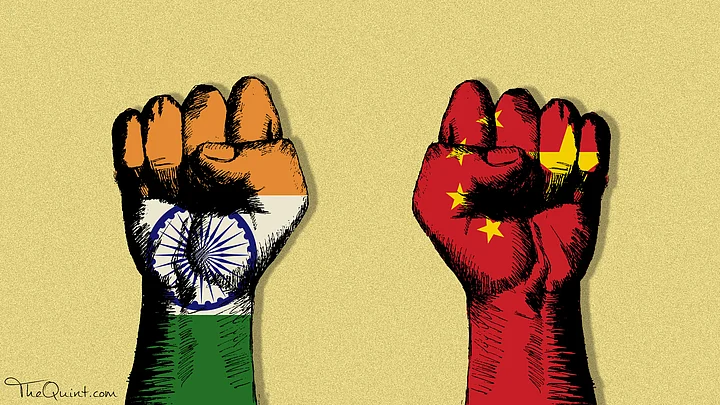An intriguing juxtaposition of two contrasting events this week points to both success and failure in Prime Minister Narendra Modi’s foreign policy. There he was, enveloping Israeli PM Benjamin Netanyahu in yet another bear hug, and finding his counterpart matching him in rhetorical enthusiasm, acronym for acronym.
And yet there was also the ugly standoff on the India-China-Bhutan border, with the two armies engaged in a tense stalemate as the rhetoric from Beijing escalated to levels unheard of since 1962.
Also Read: PM’s Israel Visit: High on Hype But Low on Deliverables
De-Hyphenating Palestine
The Israel visit marked the culmination of 25 years of steadily warming relations, since the Narasimha Rao government upgraded diplomatic representation to the Ambassadorial level, after more than four decades of dealing with each other through consuls.
Mr Modi’s decision to skip the Palestinian territories, which visiting Indians had invariably clubbed together with any visit to Israel, suggested that the relationship with Tel Aviv had reached a level of maturity that indicated it could stand on its own feet.
As a country that had long been allergic to foreigners “hyphenating” us with Pakistan in their own travel itineraries, India decided to decouple Israel and Palestine as well in a sign of self-confidence.

At the Expense of Arab Sensitivities
At the same time, New Delhi had taken pains to assuage Arab sensitivities earlier by well-publicised Prime Ministerial visits to Saudi Arabia, the UAE and Iran.
And when India received the Palestinian President Mahmoud Abbas in May, no doubt he was told in advance that the forthcoming visit to Israel did not imply any lessening of India’s long-standing commitment to justice for the Palestinian cause.
Still, there was some heartburn in the Occupied Territories, on which Delhi will have to apply balm in the months to come.
It is difficult to imagine how a relationship carefully nurtured for a generation could come unstuck quite so calamitously, unless New Delhi took its eyes off the ball.
Also Read: View from Bhutan: China Has Always Had Its Eye on Doklam

China’s Belligerence
Between 1991 and 2013, we had multiplied our trade with China 230 times, exchanged several bonhomous visits and cooperated in the founding of BRICS and its New Development Bank.
Whatever the proximate cause, we have now reached a point where not only are our soldiers tensely facing each other over disputed territory, but China has become decidedly belligerent, cancelling permission for Indian pilgrims to travel to Mansarovar via the recently-opened Nathu La route, and saying there would be no talks with New Delhi until the Indian Army withdrew.
Since that prejudges the outcome of any talks, it is a significant escalation, and puts the onus on India to blink first – which no self-respecting government in Delhi will do.
Provoking the Dragon
Meanwhile, the Chinese Government-controlled official media has gone ballistic with extraordinary statements recalling 1962 and the “lesson” India had been previously taught, stating that China would rethink its position on Sikkim’s accession to India as well as Bhutan’s dependence on us.
This is provocative and offensive language, which signals clearly that the gloves are coming off.
How did New Delhi allow things to get this bad? Of course China has not been particularly friendly to us, judging by its opposition to our NSG bid and its bloody-minded blocking of the UN blacklisting of Pakistani terrorist Masood Azhar.
Could we even have engaged better with Beijing by welcoming the intent of OBOR, but suggesting a road that ran through Indian territory to ports in Gujarat – just to show we were not obstructing their grand vision?
Weaknesses in Delhi’s Strategic Thinking
No one knows, but that’s also because no one seems to be thinking along creative new lines in the Modi Government. The China standoff points to an alarming lack of coherent strategic thought in Delhi. The Prime Minister’s incessant globe-trotting has undoubtedly marked his personal presence on the world stage, after years of exclusion.
But it is very difficult to point to any concrete accomplishments from any of his trips, whether in measurable gains that can be quantified (e.g. in increased investments) or in the less tangible, but equally important foreign policy turn-arounds that leaders point to as evidence of their persuasive powers.
Pakistan is the worst example of inconsistent policy making without a clear strategy; China has now joined it in that category.
As a patriotic Indian, I certainly hope New Delhi does not blink. But I also hope we start to think. For those concerned about our place in the world, there’s a lot to think about.
(Former UN under-secretary-general, Shashi Tharoor is a Congress MP and an author. He can be reached @ShashiTharoor. This is an opinion piece and the views expressed above are the author’s own. The Quint neither endorses nor is responsible for the same.)
(At The Quint, we are answerable only to our audience. Play an active role in shaping our journalism by becoming a member. Because the truth is worth it.)
